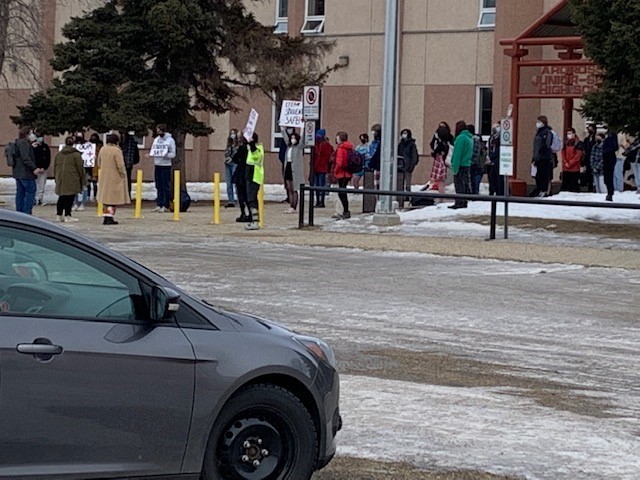Alberta kids who went back to school on Monday had one less thing to pack. Last week, Premier Jason Kenney announced the masking mandate in schools would drop at the stroke of midnight on Feb. 13.

Masks are no longer required for all children and teens in schools, according to Phase 1 of Alberta’s phased approach to lifting public health restrictions. The new measures also mean masking is not required for kids aged 12 and under in any setting, such as a daycare.
The announcement was faced with both praise and criticism.
Parents of children who are immunocompromised saw it as a step backwards in the protection of all those who attend school.
On Monday, the Alberta Federation of Labour said a request for an injunction to keep masks in place was filed Sunday on behalf of several parents who have children living with disabilities.
The Alberta Teachers’ Association (ATA) also didn’t mince words last week, calling on the government to “take a more cautious approach regarding the removal of safety protocols in schools.”
Meanwhile, some of those protesting at the Coutts border saw it as a small win for their children, even though they’re now demanding all mandates be dropped.

School walkouts
Numerous school walkouts were planned by concerned students from across the province on Monday, with many opposing the move by the provincial government to lift restrictions so quickly.
“We are a group of concerned students that care for our future and what is happening to our teachers and communities,” said William Devine in a news release sent to Global News about a walkout planned at Nelson Mandela High School in Calgary.

It was hard to tell that masks were no longer mandatory outside of St. Francis High School in Calgary on Monday. Students estimated that over half of their classmates were still donning face coverings.

Get weekly health news
“I don’t want to be the one not wearing the mask. Until a lot of people start not wearing a mask, I’m just going to wear it like everybody else,” said Grade 10 student Sarah Zahn.
“Some teachers were, I wouldn’t say pressuring students, but I feel like they tried to encourage them to wear masks.”
Grade 11 student Kervony Kusi said: “There wasn’t any pressure. I had the choice to wear it. I feel safer with it on. That’s why I chose to wear it.”
How to discuss complex issues
Parenting expert and family therapist Alyson Schafer joined Global Edmonton’s morning show to discuss how to have open conversations with children in unprecedented times.
“I know parents are always so nervous about these conversations that are complex, that are difficult and I guess my first piece of advice to tell parents is you’re probably doing a better job at communicating than you already know,” Schafer said.
“Don’t be frightened — we want to make sure that we present information in a factual way that’s age appropriate.”
Schafer explained there’s no sense in “prettying up” a situation, and rather to trust kids can handle the truth. By letting children know it’s a complex issue at the start it will help them navigate for themselves how they want to approach the topic, such as wearing a mask or not wearing a mask.

She added it’s also good practice to show all sides of the story as best you can.
“You might then just want to add: ‘and here’s how I feel about it,’ or ‘here’s how our family is going to handle this situation,’ but we really want to leave room for diversity,” she said.
“We don’t want this to become a source of tension for our kids where we think that we’re making some kind of a statement about those who do or don’t make a different decision from our family, such that we create a friction in our friendships, or a friction between our home and school because we like those to be aligned and more collegial kind of relationship.”
- Calgary man who joined ISIS in 2013 receives 16-year prison sentence
- Motherhood, family bring new perspective to Games for 3-time Canadian Olympian
- Calgary jewelry store owner loses fortune in gold to late night smash-and-grab
- Temperatures soar in Western Canada as eastern parts of the country bundle up
Schafer points to the Piaget cognitive development theory where those in the younger age group of pre-school are more like sponges who soak up just about anything their parents have told them.
Whereas once kids become a bit older, up until about junior high, is when they start to become critical thinkers and problem solvers.
“You don’t just want to indoctrinate them, you kind of want them to use their noodles (brains), but they’re really kind of not there yet, so you can put it out as an interesting… question,” she explained.
Then, when kids are in high school, they start to debate, which Schafer said is healthy to ask those tough questions and to help them look for more than just two sides to a story.
Though some issues during COVID-19 have been a hot topic, Schafer said she sees it as a great opportunity for those with kids to have those complex conversations because in the end, it will make the kids better critical thinkers and problem solvers.

– With files from Carolyn Kury de Castillo







Comments